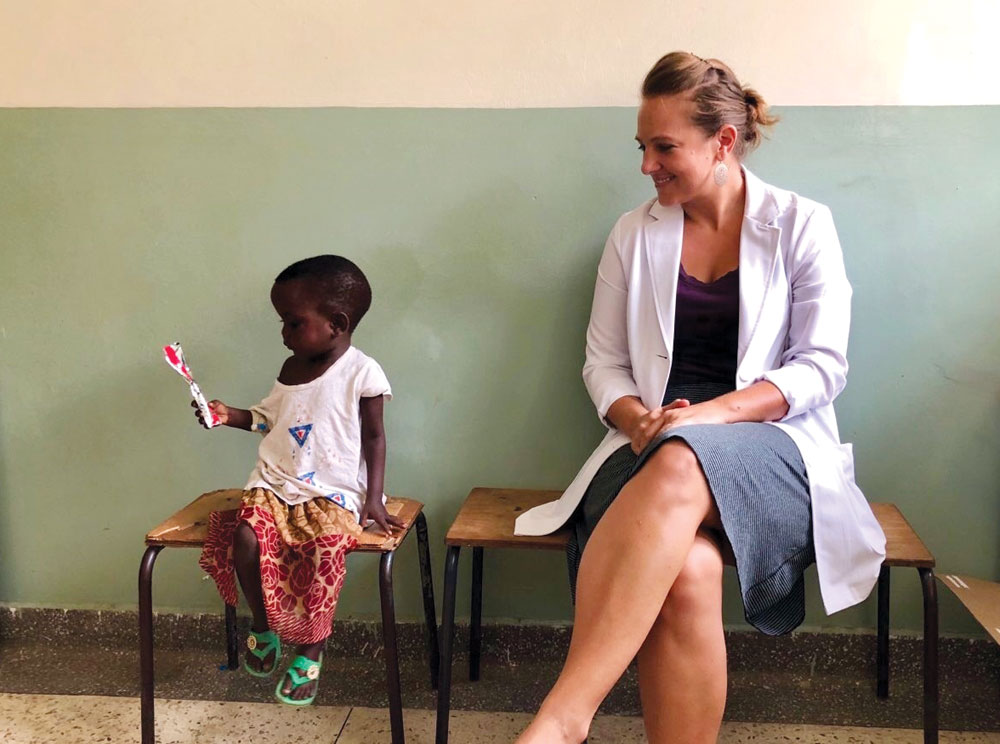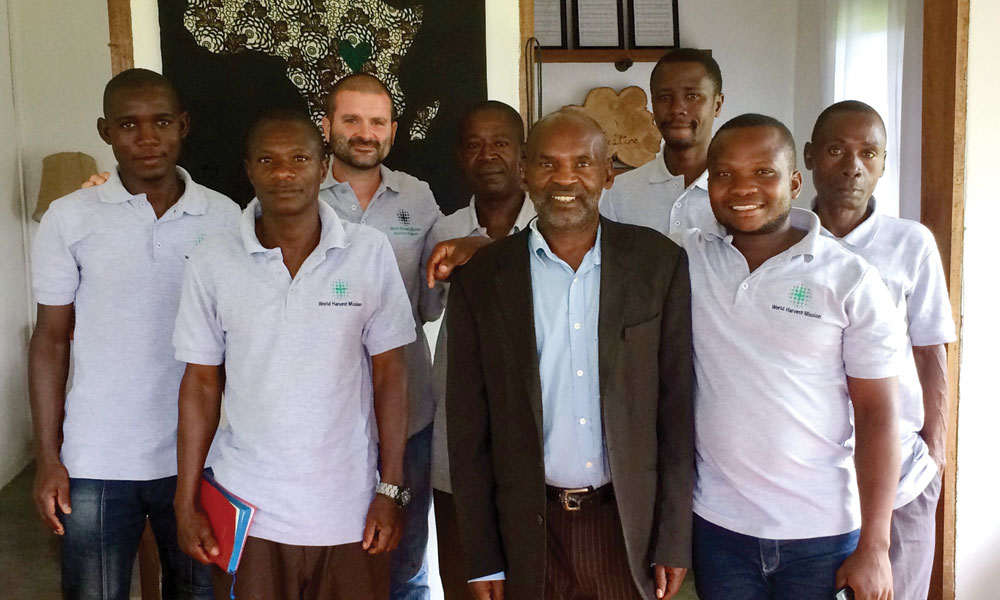What Does It Mean to “Do Good?”
Brent and Alisha Justice recently completed a term of service in Uganda, managing a malnutrition program and the property of the health center where they lived and worked. There was much to do and much to learn.
By Brent Justice

Alisha Justice with a child in the malnutrition clinic program, where she served as manager in Bundibugyo. Photo courtesy of Brent Justice
It happened at the end of one of those days flooded with moments of existential questioning: “What am I doing here? Is what I’m doing even good?”
Several attempts at deeply engaging Ugandan friends and neighbors had stalled, ministry initiatives had shrunk, and relationships felt shallow and perfunctory at best—and manipulative at worst.
We had moved to Uganda with the desire and intent to engage the community in Bundibugyo holistically. Yet Alisha was so busy fighting against a corrupt and broken healthcare system, on top of managing inpatient and outpatient malnutrition clinics, and I was so busy managing the mission station’s many maintenance and employee issues that our deep desire for meaningful, gospel-centered relationships seemed to have been left behind.
We were ostensibly doing good work in the community, but the lack of transformative spiritual engagement left us feeling empty, dissatisfied, and questioning. This desire to see gospel transformation take root began, however, in a startling and unforeseen way: right in the midst of, and in fact, through, my brokenness.
We were in the middle of the “hungry season” in Bundibugyo, the dry season between cocoa harvests where there is no income, and when—because all available land typically goes to planting cocoa trees—there is no garden either. It had been a long and wearisome day of fielding endless requests, needs, and demands for assistance when yet another knock came to our door. I was right in the middle of some “important” task, and upon going to the door, my thinly veiled frustrations at the numerous interruptions throughout the day came spilling out.
I lost the veil completely. I was rude, short, and inhospitable to a good neighbor and friend who came by to greet me. Because of my behavior, he was quickly and obviously wounded and soon left. After he left, I tried to brush aside the guilt and conviction I felt. I attempted to justify my anger at being interrupted, because, of course, I was so busy trying to “do” ministry—to do good.
But, I had lost sight of the real purpose of ministry, and had fallen victim to this most dangerous distraction of ministry: busyness. Instead of valuing others and glorifying God by showing, telling, and bringing others closer to Christ through relationships, I had over-prioritized managerial tasks, project completion, and efficiency.
However, in a sweet mercy, the Spirit quickly brought to mind a statement I had read only a few days earlier: “My whole life I have been complaining that my work was constantly interrupted, until I discovered that my interruptions were my work.” (Henri Nouwen, Reaching Out, p. 51)
Allowing myself to pause and ponder this understanding of ministry created space in my “busy” schedule for the gospel to flood my heart. I saw that if Christ—who “is before all things, and in whom all things hold together” (Col. 1:17) — was not too busy creating and sustaining the universe to come to earth to rescue, redeem, and reconcile sinners to himself, then who am I to think that I am too busy to invite others into relationship with him?
I then rushed towards the woodshop to find this dear neighbor, to confess and repent of the pride and anger of my heart, and seek his forgiveness for my un-neighborly behavior. Amazingly, it was through this act of humiliation (culturally, the “boss” does not apologize or seek forgiveness) that a wide door for gospel growth opened—not only with this friend, but with the dozen other men in the woodshop who witnessed the outworking of the gospel as I confessed my wrongdoing and repented of my sins.

Employees of World Harvest Mission after a Bible study: (from left) Happy Michael, Mugisa, Brent Justice, Kapu, Kisembo Akleo, Kadema, Ahebwa Johnson, and Tibesigwa. Photo courtesy of Brent Justice
After our reconciliation, my friend and I were able to explain to these men (in Lubwisi, the local language) not only the gospel of Jesus, but how it then propels and motivates our relationships with others. It was out of the brokenness of my frustration and failure that God created a beautiful opportunity for me to share his love with others.
From that day on, my relationship with this friend grew and deepened, and, through him, several relationships with others grew and deepened.
This incident served to teach me how—through busyness and aggrandizing “ministry”—I slowly and subtly drifted into a functional paradigm where my notion of “doing” good had been divorced from my notion of “being” good. My mind, heart, and actions had become compartmentalized. I struggled to balance a desire to be theologically relevant, relationally engaged, and yet, still find time to do “good” work. My mistake was a wrong understanding, resulting in a wrong application, of what “good” entails.
We read in Micah 6:8, “[God] has told you, O mortal, what is good; and what does the Lord require of you but to do justice, and to love kindness, and to walk humbly with your God?” According to Daniel J. Simundson, this co-mingling of biblical concepts—doing justice, loving kindness, and walking humbly with God—results in what God calls good: not an unbalanced approach that over-emphasizes one component at the expense of the others, but rather, in a holistic union of work (doing justice, particularly for the weak and powerless), relationships with others (loving kindness), and relationship with God (walking humbly, being careful to put God first and live in conformity with God’s will.)
Therefore, as I learned through this situation, doing good is simply the holistic overflow of being good. And the great news of the gospel is that while this goodness is not inherent within us, God freely offers us a new heart and new spirit by his grace. It is this that I want to preach to myself daily, so that my life can be shaped and reoriented toward this outpouring of good toward others.
